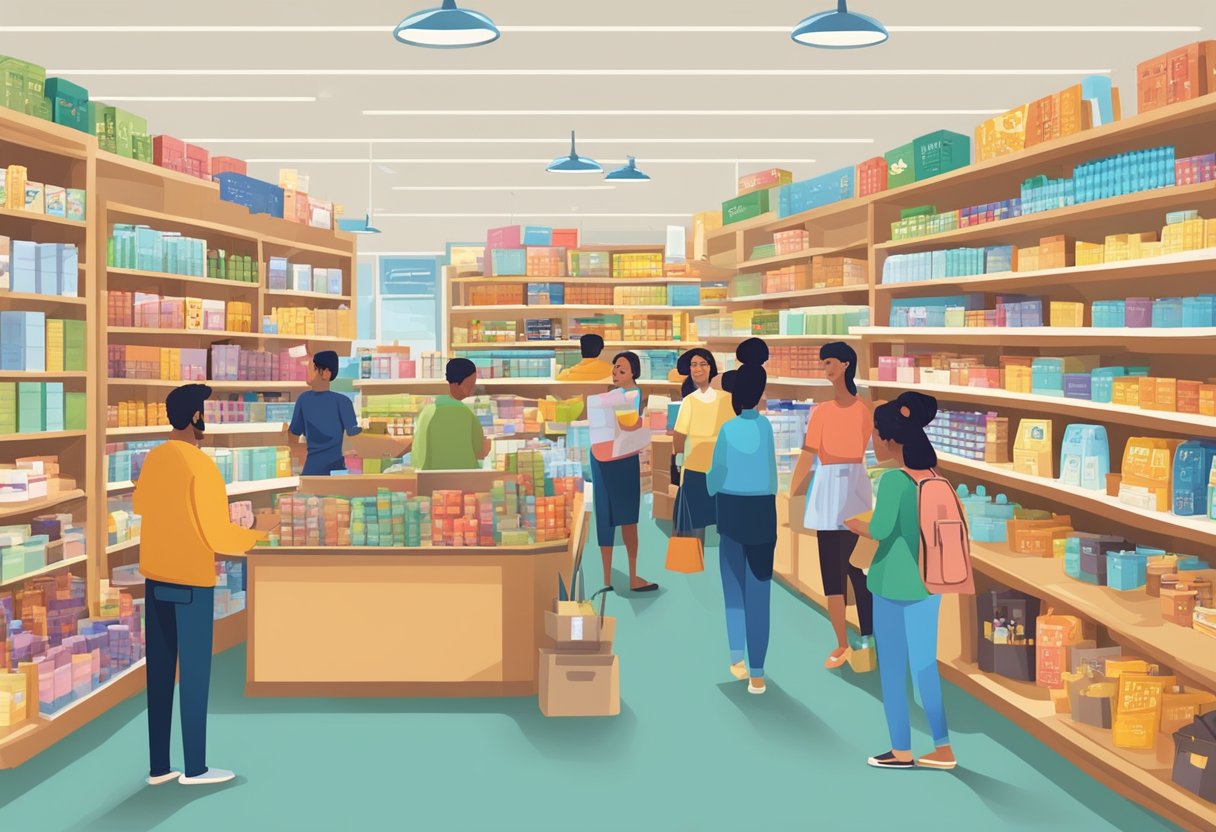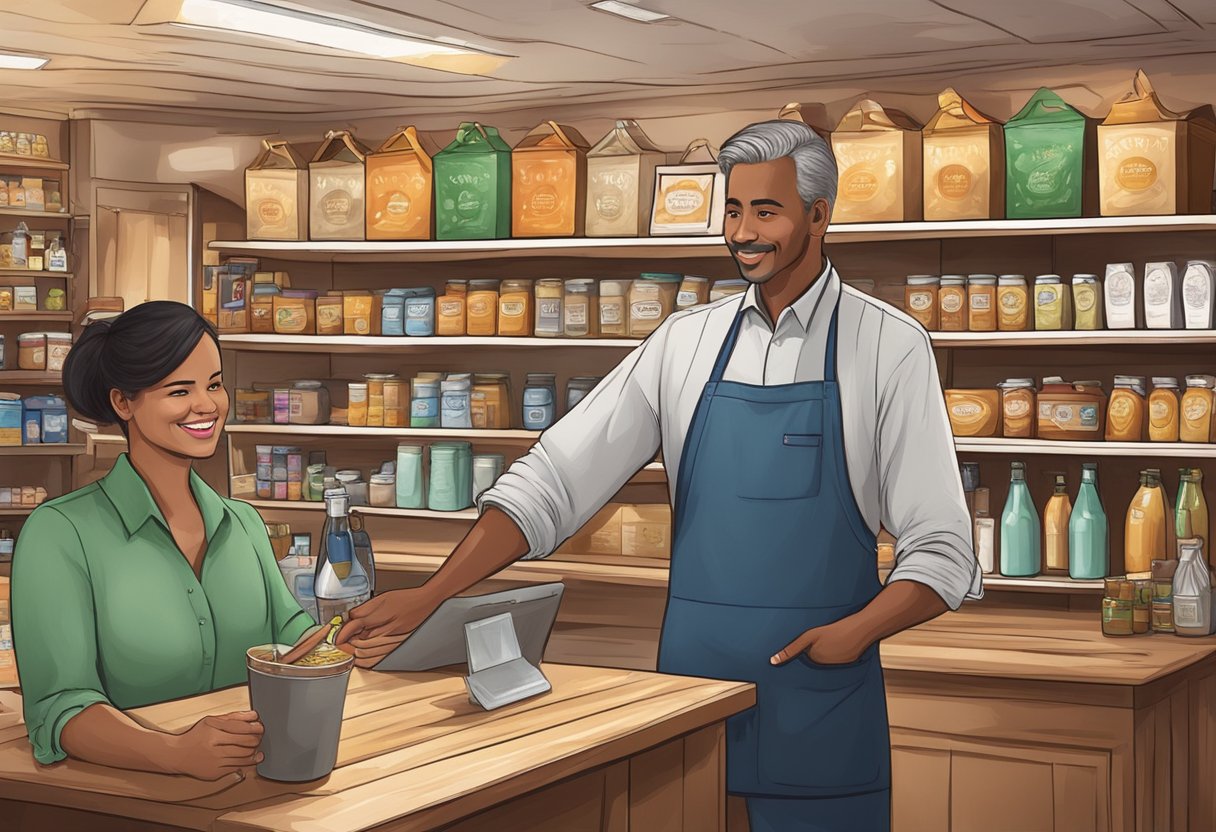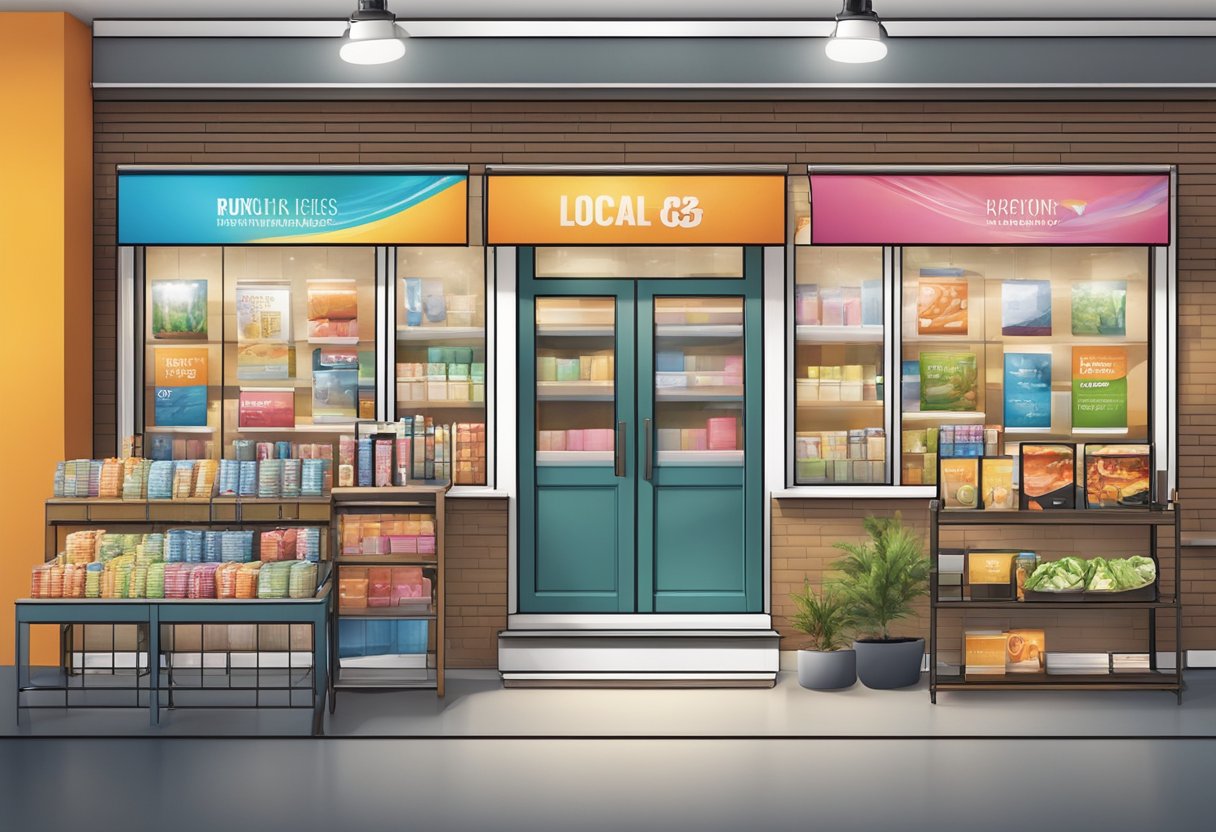Local store marketing is a strategy that small businesses use to promote their products and services to their local community. It involves developing a marketing plan that is tailored to the unique needs and preferences of the local market. By targeting the local community, businesses can build strong relationships with their customers and increase their brand awareness.

Understanding Local Store Marketing
To effectively implement local store marketing, businesses must first understand the needs and preferences of their local market. This involves conducting market research to identify the demographics, behaviors, and preferences of their target audience. By understanding the local market, businesses can develop marketing strategies that resonate with their customers and differentiate themselves from their competitors.
Developing a Local Store Marketing Plan
Once businesses have a clear understanding of their local market, they can develop a marketing plan that is tailored to their specific needs and preferences. This involves identifying the marketing tactics that will be most effective in reaching their target audience and developing a budget and timeline for implementing these tactics. By developing a comprehensive marketing plan, businesses can ensure that their marketing efforts are focused and effective.
Key Takeaways
- Local store marketing is a strategy that small businesses use to promote their products and services to their local community.
- To effectively implement local store marketing, businesses must first understand the needs and preferences of their local market.
- Developing a comprehensive marketing plan is essential for ensuring that local store marketing efforts are focused and effective.
Understanding Local Store Marketing
Definition and Importance
Local store marketing is a marketing strategy that focuses on promoting a business to its local community. It is a way for businesses to increase their brand awareness, attract new customers, and build relationships with their existing customers. Local store marketing is particularly important for small businesses because it allows them to compete with larger businesses that have a national or global reach.
One of the key components of local store marketing is local SEO (search engine optimization). Local SEO helps businesses to rank higher in local search results, making it easier for people in the local community to find them. This is important because many people use search engines to find businesses in their area.
Key Components of Local Store Marketing
There are several key components of local store marketing that businesses should focus on:
- Brand awareness: Businesses should focus on building their brand awareness in the local community. This can be done through advertising, social media, and other marketing channels.
- Local community: Businesses should build relationships with their local community. This can be done by sponsoring local events, participating in community activities, and supporting local charities.
- Local SEO: Businesses should optimize their website for local search. This includes using local keywords, creating local content, and optimizing their Google My Business listing.
- Customer experience: Businesses should focus on providing a great customer experience. This includes providing excellent customer service, offering promotions and discounts, and creating a welcoming atmosphere in their store.
To learn more about local store marketing, check out this article from Entrepreneur.com.
Developing a Local Store Marketing Plan
Creating a local store marketing plan is essential for retailers who want to increase their sales and attract new customers. A well-planned marketing strategy can help retailers identify their target market, set objectives, and allocate their budget efficiently.
Setting Objectives
Setting objectives is the first step in developing a local store marketing plan. Objectives should be specific, measurable, achievable, relevant, and time-bound. Retailers should identify their goals and determine what they want to achieve with their marketing strategy. For example, a retailer might want to increase sales by 10% in the next six months or attract 100 new customers to their store.
Target Market Analysis
After setting objectives, retailers should analyze their target market. This involves identifying their ideal customer and understanding their needs, preferences, and behaviors. Retailers can use different techniques to gather information about their target market, such as surveys, focus groups, or online research. By understanding their target market, retailers can tailor their marketing strategy to their customers’ needs and preferences.
Budget Allocation
Once objectives and target market analysis are completed, retailers should allocate their marketing budget efficiently. Retailers should consider different techniques to promote their store, such as advertising, direct mail, social media, or events. Retailers should allocate their budget based on their objectives and target market analysis. For example, if a retailer’s target market is young adults, they might allocate more budget to social media advertising.
Retailers should also consider their location when developing their marketing plan. A store’s location can influence its marketing strategy and techniques. For example, a store located in a shopping mall might use different techniques than a store located in a residential area.
To learn more about developing a local store marketing plan, retailers can check out this article by Shopify, which provides useful tips and insights on how to create a successful marketing plan.
Marketing Tactics for Local Stores
Local stores face unique challenges in marketing their products and services. With the right marketing tactics, however, they can attract and retain loyal customers, increase sales, and grow their businesses. Here are some effective marketing tactics for local stores:
In-Store Promotions
One of the most effective ways to attract customers to a local store is through in-store promotions. These promotions can include discounts, free samples, contests, and giveaways. By offering these promotions, local stores can encourage customers to try their products and services, and build relationships with them. In-store promotions can also help local stores stand out from their competitors and create a buzz in the neighborhood.
Local Events and Sponsorships
Local events and sponsorships are another effective way for local stores to market themselves. By participating in local events and sponsoring local sports teams or community organizations, local stores can build relationships with their customers and show their support for the community. This can help to create a positive image for the store and increase brand awareness.
Leveraging Local Media
Local media can be a powerful tool for local stores to market themselves. By reaching out to local newspapers, radio stations, and television channels, local stores can get free publicity and reach a wider audience. Local stores can also use social media to connect with their customers and share information about their products and services.
Online and Social Media Strategies
Online and social media strategies are essential for local stores to reach their target audience. By creating a website and optimizing it for search engines, local stores can increase their visibility online and attract more customers. Local stores can also use social media platforms like Facebook and Instagram to connect with their customers and share content that is relevant to their interests.
Overall, local stores need to use a variety of marketing tactics to reach their target audience and stand out from their competitors. By leveraging in-store promotions, local events and sponsorships, local media, and online and social media strategies, local stores can attract and retain loyal customers, increase sales, and grow their businesses. For more information on local store marketing tactics, check out this resource.
Building Customer Relationships

Building customer relationships is an essential aspect of local store marketing. By creating a loyal customer base, businesses can increase foot traffic, customer loyalty, and revenue. In this section, we will explore some effective strategies for building customer relationships.
Loyalty Programs and Discounts
Loyalty programs and discounts are a great way to incentivize customers to return to a store. By offering discounts or rewards to frequent customers, businesses can encourage customer loyalty and increase sales. One effective strategy is to offer a loyalty program that rewards customers for their repeat business. For example, a coffee shop might offer a free drink after a certain number of purchases. Another effective strategy is to offer discounts to customers who refer their friends or family to the store.
Community Engagement
Community engagement is another effective strategy for building customer relationships. By getting involved in local events or sponsoring community organizations, businesses can build a positive reputation and increase their online presence. For example, a local hardware store might sponsor a little league team or participate in a community clean-up day. By engaging with the community, businesses can build trust with their customers and increase foot traffic.
Customer Service Excellence
Customer service excellence is crucial for building customer relationships. By providing exceptional customer service, businesses can create a positive experience for their customers and increase customer loyalty. One effective strategy is to train employees to provide personalized service to each customer. By taking the time to understand their needs and preferences, businesses can create a positive experience that will keep customers coming back.
In conclusion, building customer relationships is crucial for the success of local stores. By implementing effective strategies such as loyalty programs, community engagement, and customer service excellence, businesses can create a loyal customer base and increase revenue. For more information on building customer relationships, check out this resource from Forbes.
Offline Marketing Materials

Offline marketing materials are an essential part of any local store marketing strategy. These materials can help businesses reach out to potential customers in the local community and increase brand awareness. Here are some of the most effective offline marketing materials:
Signage and Outdoor Advertising
Signage and outdoor advertising are some of the most visible marketing materials for local stores. They can include banners, posters, billboards, and signs. These materials are effective because they catch the attention of people passing by and can communicate key information about the business, such as its name, products, and services.
According to a study by the International Sign Association, “Signage is the most effective, yet least expensive form of advertising for small businesses.” Businesses can use outdoor advertising to target specific audiences, such as commuters, pedestrians, or drivers.
Print Materials and Direct Mail
Print materials and direct mail are other effective offline marketing materials. These can include flyers, brochures, business cards, and postcards. Print materials are useful because they can be distributed to potential customers in the local community.
Direct mail campaigns can be targeted to specific demographics and can include coupons or other promotional offers to encourage customers to visit the store. According to the Data & Marketing Association, “Direct mail has a response rate of 5.1% for house lists and 2.9% for prospect lists.”
Networking and Partnerships
Networking and partnerships are essential for local store marketing. Businesses can join local chambers of commerce or other business organizations to connect with other businesses in the community. These partnerships can lead to cross-promotion opportunities and referrals.
Businesses can also partner with other local businesses to create joint marketing campaigns or events. This can help businesses reach a wider audience and increase brand awareness.
In conclusion, offline marketing materials are an important part of any local store marketing strategy. Signage and outdoor advertising, print materials and direct mail, and networking and partnerships are some of the most effective materials. By using these materials, businesses can increase brand awareness and connect with potential customers in the local community.
For more information on effective offline marketing strategies, check out this resource from Entrepreneur.
Digital Marketing for Local Stores

Local stores can benefit greatly from digital marketing tactics that help them reach potential customers in their area. By optimizing their online presence, creating content that resonates with their target audience, and leveraging email and social media campaigns, local stores can increase their visibility and drive more foot traffic to their physical location.
Optimizing Online Presence
One of the first steps in digital marketing for local stores is to ensure that they have a strong online presence. This includes creating a Google Business Profile, which allows customers to find the store on Google Maps and search results. By optimizing the profile with accurate information, photos, and reviews, local stores can increase their chances of appearing in local search results.
Another important aspect of online presence is having a website that is optimized for local search. This means including relevant keywords, creating location-specific content, and ensuring that the website is mobile-friendly. By doing so, local stores can improve their chances of appearing in search results when potential customers are looking for products or services in their area.
Content Marketing and SEO
Creating high-quality content is an effective way for local stores to attract potential customers and improve their search engine rankings. This can include blog posts, videos, infographics, and other types of content that are relevant to the store’s target audience. By incorporating relevant keywords and optimizing the content for search engines, local stores can improve their chances of appearing in search results and driving traffic to their website.
Email and Social Media Campaigns
Email and social media campaigns can be powerful tools for local stores to connect with customers and promote their products or services. By building an email list and sending regular newsletters or promotions, local stores can keep their customers engaged and informed about new products or upcoming events.
Social media marketing can also be an effective way for local stores to reach potential customers and build brand awareness. By creating engaging content and leveraging geo-targeting, local stores can reach customers in their area and promote their products or services to a wider audience.
Overall, digital marketing can be a valuable tool for local stores to increase their visibility and drive more foot traffic to their physical location. By optimizing their online presence, creating high-quality content, and leveraging email and social media campaigns, local stores can reach potential customers and build a loyal customer base.
Here is a helpful resource for understanding more about local search marketing and optimizing online presence.
Measuring and Analyzing Performance

Local store marketing strategies require careful planning and execution to achieve success. Measuring and analyzing performance is crucial to determine the effectiveness of marketing efforts and make necessary adjustments. Here are some ways to measure and analyze performance:
Sales Tracking and ROI
Sales tracking and return on investment (ROI) analysis are essential tools for measuring the success of local store marketing strategies. Retailers can use sales tracking software to monitor sales and identify trends. ROI analysis helps to determine the profitability of marketing campaigns and identify areas for improvement.
Customer Feedback and Surveys
Customer feedback and surveys are valuable sources of information for local store marketing. Retailers can use customer feedback to identify areas for improvement and implement changes to meet customer needs. Surveys can also help retailers understand customer preferences and tailor marketing efforts to their interests.
Adjusting Strategies Based on Data
Retailers should use data to adjust their local marketing strategies. Analyzing sales data, customer feedback, and other relevant metrics can help retailers identify areas for improvement and make changes to their marketing strategies. Retailers can use tools such as A/B testing to test different marketing strategies and determine which ones are most effective.
Overall, measuring and analyzing performance is critical to the success of local store marketing strategies. Retailers should use data to make informed decisions about their marketing strategies and adjust them as necessary to achieve their goals.
For more information on measuring and analyzing performance in local store marketing, check out this article from Forbes Agency Council.
Local Marketing Case Studies

Success Stories
Retail Marketing:
A local retail store in downtown partnered with a nearby coffee shop to offer a discount for customers who visited both establishments. The promotion was advertised through social media and flyers, resulting in a 20% increase in foot traffic for both businesses.
Salon:
A salon in a suburban area collaborated with a local festival to offer free hair styling sessions at the event. They also distributed promotional flyers and offered a discount for festival-goers who booked an appointment at the salon. This resulted in a 30% increase in new clients for the salon.
Seasonal Promotion:
A brick-and-mortar business in a tourist area offered a seasonal promotion for the summer months, advertising it through social media and local partnerships. The promotion included a discount for locals and a free gift with purchase for tourists. This resulted in a 25% increase in sales during the promotion period.
Lessons Learned
Co-Marketing:
A local restaurant partnered with a nearby workshop to offer a cooking class and meal package. The promotion was advertised through social media and email marketing, resulting in a sold-out event and positive feedback from attendees. This shows the power of co-marketing and collaborating with other businesses in the community.
References:
When promoting a business or event, it can be helpful to include references from satisfied customers or previous attendees. A coffee shop in a city center included testimonials from regulars on their website and social media, resulting in an increase in new customers.
Festivals:
Participating in local festivals and events can be a great way to reach a new audience and promote a business. A retail store in a small town set up a booth at a local festival and offered a discount for attendees who visited their store afterwards. This resulted in a 15% increase in sales during the festival weekend.
For more information on successful local marketing strategies, check out this article from Forbes Agency Council.
Frequently Asked Questions

How can a local shop effectively implement a marketing strategy?
Implementing a marketing strategy for a local shop can be challenging, but there are several steps that can be taken to ensure success. First, it is important to define the target audience and understand their needs and preferences. Once this is established, the shop can create a marketing plan that includes tactics such as social media marketing, email marketing, and local advertising. Consistency and creativity are key to a successful marketing strategy, and it is important to track and analyze the results to make necessary adjustments.
What are some successful local marketing tactics for restaurants?
Restaurants can benefit from a variety of local marketing tactics, such as hosting events, partnering with other local businesses, and offering promotions to local customers. Social media marketing is also an effective way to reach a wider audience and engage with customers. Additionally, creating a strong online presence through a website and online reviews can help attract new customers and retain existing ones.
What responsibilities does a local store marketing job entail?
A local store marketing job typically involves developing and executing marketing strategies to promote a local store or chain of stores. This may include creating promotions, managing social media accounts, coordinating events, and analyzing data to measure the success of marketing efforts. The job requires strong communication skills, creativity, and the ability to work independently.
How has McDonald’s approached local store marketing?
McDonald’s has a long history of successful local store marketing campaigns. One example is their “My McDonald’s” campaign, which encouraged customers to share their favorite McDonald’s memories on social media. The campaign helped create a sense of community and connection with customers, and it was successful in generating buzz and increasing sales.
Can you provide examples of effective local store marketing campaigns?
One example of an effective local store marketing campaign is the “Shop Small” campaign by American Express. The campaign encourages consumers to support small businesses in their local communities, and it has been successful in driving sales and increasing awareness of small businesses. Another example is the “Share a Coke” campaign by Coca-Cola, which personalized bottles with customers’ names and encouraged them to share photos on social media. The campaign was successful in generating buzz and increasing sales.
What are the key components of a comprehensive LSM plan?
A comprehensive local store marketing plan should include a clear understanding of the target audience, a defined marketing strategy, tactics for reaching the target audience, and a plan for measuring and analyzing results. It should also include a budget and a timeline for executing the plan. Consistency and creativity are key to a successful LSM plan, and it is important to stay up-to-date with industry trends and best practices.
For more information on local store marketing, check out this article by Forbes Agency Council.




